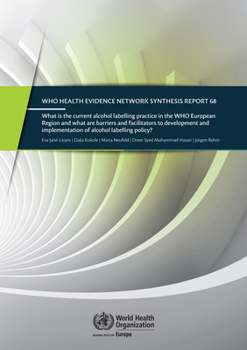What Is the Current Alcohol Labelling Practice in the Who European Region and What Are Barriers and Facilitators to Development and Implementation of
The WHO European Region has the highest levels of alcohol consumption per capita in the world, yet alcohol labelling--a WHO-recommended practice that provides consumer information on the ingredients, nutritional values, and harms of alcohol--is not mandatory.
This report synthesizes evidence on alcohol labelling practices in the Region and describes factors affecting implementation. To date, the introduction of alcohol labelling policy as part of a larger package of alcohol policy measures--created with strong political support and consumer pressure--has proved successful in providing consumers with information, although practices have been hindered by slow procedures in some parts of the Region; opposition from international institutions and the alcohol industry; and the lack of set labelling specifications and monitoring activities. Policy considerations for the development of successful labelling legislation should ideally address both health and nutritional information to ensure regulated message presentation and the implementation of independent monitoring and evaluation of measures.





